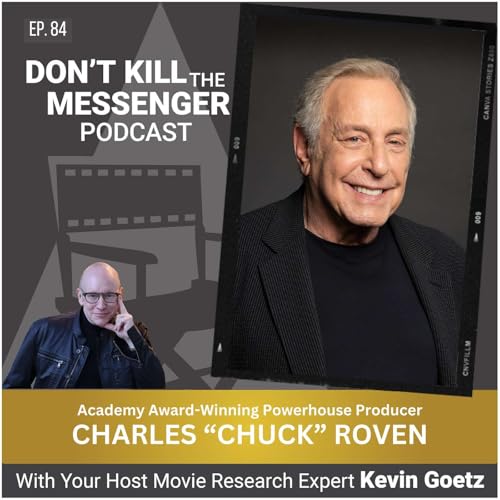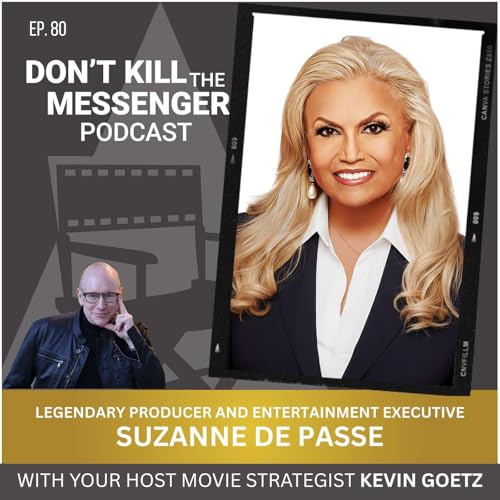Send Kevin a Text Message
In this episode of Don't Kill the Messenger, host Kevin Goetz sits down with legendary producer and entertainment executive Suzanne de Passe. From championing the Jackson 5 early in their career to producing Emmy Award–winning miniseries like Lonesome Dove, Suzanne’s career is defined by vision, talent recognition, and breaking barriers in Hollywood.
An Eclectic, Wonderful Childhood (02:16) Suzanne describes growing up in Harlem, attending the progressive private school New Lincoln, and spending summers in Martha's Vineyard.
Suzanne’s Superpower (12:46) Suzanne talks about her greatest talent: recognizing the talent of others and knowing what to do with it.
The Meeting That Changed Everything (16:22) Through her friendship with Cindy Birdsong of The Supremes, Suzanne met Berry Gordy in 1967, a moment that changed her life forever.
"One Day, That's Gonna Be Me" (21:19) Standing under the Essex House sign, watching Diana Ross depart in one limo, and the other Supremes in another, Suzanne had a realization: she wanted to be a part of that world.
Championing The Jackson 5 (31:39) When Bobby Taylor invited her to hear a young group of brothers sing four songs a cappella, “the hair on the back of my neck flew up,” Suzanne recalls. Despite Berry Gordy’s initial resistance to signing another kid act, her relentless advocacy is what finally got the Jackson 5 their Motown audition.
Rock and Roll Hall of Fame Induction (38:04) In 2024, Suzanne was inducted into the Rock and Roll Hall of Fame with the Ahmet Ertegun Award, the fifth woman and the first solo living female recipient among male legends.
Lonesome Dove (40:28) After optioning Larry McMurtry's unpublished novel for $50,000, Swifty Lazar called with news: it had won the Pulitzer Prize. The resulting CBS miniseries was nominated for 19 Emmys, won 11, and received a Golden Globe and a Peabody Award.
Immortal Studio: The Next Chapter (51:17) Suzanne has launched the production company Immortal Studio with partners Madison Jones, Cory Martin, and investor Yang Ben Wang. Focused on premium television, the company already has full seasons scripted and is built to be nimble, artist-friendly, and protective of creative vision — avoiding the industry’s usual “fingerprinting process,” where too many people try to leave their mark.
Suzanne de Passe demonstrates that recognizing talent, whether in five kids singing a capella or an unpublished western novel, combined with persistence and vision, can build an entertainment legacy that spans decades.
Host: Kevin Goetz
Guest: Suzanne de Passe
Producer: Kari Campano
Writers: Kevin Goetz, Darlene Hayman, and Kari Campano
Audio Engineer: Gary Forbes (DG Entertainment)
For more information about Suzanne de Passe:
Wikipedia: https://en.wikipedia.org/wiki/Suzanne_de_Passe
IMDB:https://www.imdb.com/name/nm0210867/
Rock and Roll Hall of Fame:
For more information about Kevin Goetz:
- Website: www.KevinGoetz360.com
- Audienceology Book: https://www.simonandschuster.com/books/Audience-ology/Kevin-Goetz/9781982186678
- How to Score in Hollywood: https://www.amazon.com/How-Score-Hollywood-Secrets-Business/dp/198218986X/
- Facebook, X, Instagram, TikTok, YouTube, Substack: @KevinGoetz360
- LinkedIn @Kevin Goetz
- Screen Engine/ASI Website: www.ScreenEngineASI.com
 49 m
49 m Jan 21 202653 m
Jan 21 202653 m 43 m
43 m Dec 17 202557 m
Dec 17 202557 m 59 m
59 m 59 m
59 m 58 m
58 m Oct 15 202557 m
Oct 15 202557 m
